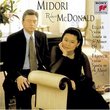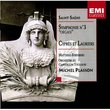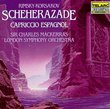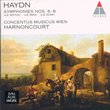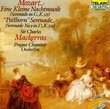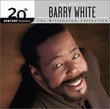| All Artists: Claude Debussy, Eduard Van Beinum, Bernard Haitink, Royal Concertgebouw Orchestra Title: Debussy: Orchestral Music Members Wishing: 0 Total Copies: 1 Label: Philips Release Date: 2/15/1994 Genres: Dance & Electronic, Special Interest, Classical Styles: Marches, Ballets & Dances, Ballets, Chamber Music, Historical Periods, Modern, 20th, & 21st Century, Instruments, Reeds & Winds Number of Discs: 2 SwapaCD Credits: 2 UPC: 028943874229 |
Search - Claude Debussy, Eduard Van Beinum, Bernard Haitink :: Debussy: Orchestral Music
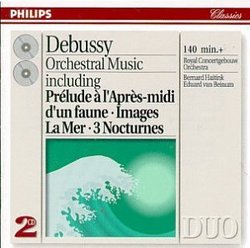 | Claude Debussy, Eduard Van Beinum, Bernard Haitink Debussy: Orchestral Music Genres: Dance & Electronic, Special Interest, Classical
Bernard Haitink's recordings of the Nocturnes and Jeux were hailed as among the finest available when initially issued. That LP provided rather short measure. Now you can get all of Debussy's most important orchestral m... more » ![header=[] body=[This CD is available to be requested as disc only.]](/images/attributes/disc.png?v=a4e11020) ![header=[] body=[This CD is available to be requested with the disc and back insert.]](/images/attributes/disc_back.png?v=a4e11020) ![header=[] body=[This CD is available to be requested with the disc and front insert.]](/images/attributes/disc_front.png?v=a4e11020) ![header=[] body=[This CD is available to be requested with the disc, front and back inserts.]](/images/attributes/disc_front_back.png?v=a4e11020) |
Larger Image |
CD DetailsSynopsis
Amazon.com Bernard Haitink's recordings of the Nocturnes and Jeux were hailed as among the finest available when initially issued. That LP provided rather short measure. Now you can get all of Debussy's most important orchestral music on two CDs for the price of one, and if the remaining performances don't quite reach the exalted level of the Nocturnes and Jeux, they come so close as to make no difference. Haitink was not a very assertive conductor (and he's gotten less so with age), but he was fortunate to have one of the world's best orchestras at the tip of his baton, and their recordings were a true collaborative effort. Their approach works particularly well for Debussy. --David Hurwitz Similar CDsSimilarly Requested CDs
|
CD ReviewsEssential everyday listening. Ed Brickell | 07/02/2001 (5 out of 5 stars) "Hard to believe that one of the best bargains in the entire CD catalog was rated at only three stars overall when I happened to stumble across this page. These rank among the finest played and most atmospheric Debussy recordings ever produced. There are certainly none better, and only few that I would put along beside them. Plus, you're getting two very full CDs of Debussy's finest orchestral music for the price of one. The one star reviews of this recording are absolutely bewildering. This is an outstanding product in a very crowded field." An essential set for your Debussy shelf. DAVID A. FLETCHER | Richmond, Va United States | 04/28/2002 (5 out of 5 stars) "To recap what an earlier review referred to, the "Man From Delray" below seemed more concerned with crotchety silliness than with musically informed reviewing. I remember snatching up the original Philips LP's of these Haitink performances when they emerged in the late 70's, and being "wowed" then. Yes, Haitink was not, and is not, a ZIP! ZING! POW! conductor. And, outside of a few moments in "Iberia," "La Mer," or "Jeux," you really don't want any of that in these pieces. Sensitivity to dynamics, orchestral color, and evocative phrasing, just to name a few musical virtues...these are what are called for here, and Haitink offers them in spades. That gossamer shimmer in "Nocturnes", for example. It's so easy to sell the imagery short, or just get it plain wrong. Haitink nails it, aided througout by vintage Philips sound that was a model of naturalness in its day, and still holds up nicely. Could "La Mer" take just a bit more shaping in its ebb/flow moments? Maybe. Karajan managed that in his early 60s version for DG, but his orchestral seas are clearly the North Atlantic, not the Mediterranean. So, there's room for preferences. I still prefer Boulez' old CBS/Sony performance with the New Philharmonia, except for the bone-dry recording. Fritz Reiner and the Chicago, as well as the Munch/Boston reading, really shine in RCA's Living Stereo remasterings. These are just a few of the classic readings that I wouldn't want to be without.In sum, I wouldn't want to be without Haintink's thoughts on these scores, as well as the late 50's Van Beinum "Berceuse" that fills out the set. If you're REALLY serious about the music, though, fill out your Debussy shelf with a few of the others. Better yet, if you're adept at reading a conductor's score, start building a core library of miniature editions for those pieces that you come back to again and again. In the case of "La Mer," I think the full size Dover edition is still available; the larger format is easier to deal with than the pocket-size score. Read a little critical writing about the musical architecture that you're admiring. Then, listen with the score in front of you, and identify where in a piece that you and the conductor part company. Or agree. I know that this may be above and beyond what the casual listener is up for, but if you're game, you may be surprised where it leads you." High Praise for Haitink and La Mer grok_ | San Diego, CA United States | 05/28/2003 (5 out of 5 stars) "La Mer was one of the first pieces of classical music that captured my imagination. When performed well, you envision the waves and wind on a restless sea. Here, Haitink has again stimulated my imagination with his performances. You feel the motion of the water and taste the salt upon the wind. Although this is a 2fer, I confess to listening most to the second CD, which contains not only La Mer but also the Nocturnes and the marvelous Dance for Harp (the harp soloist was unfortunately close-miked). These pieces were recorded (analog) in the late 1970s and the sonics are excellent (disk 1 was recorded in 1959). The performance comes across crystal clear. The dynamic range does justice to the demands of these often undulating compositions."
|

 Track Listings (8) - Disc #1
Track Listings (8) - Disc #1



